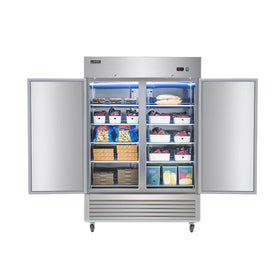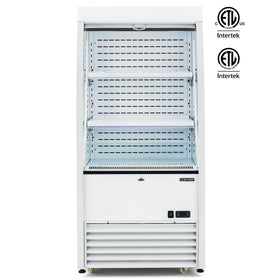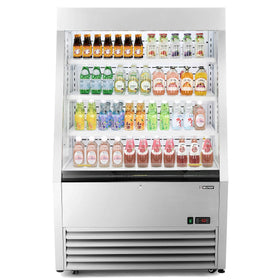Choosing the right UL-certified refrigerator for your commercial kitchen is much more than just picking a model that fits your budget.
It's about finding a refrigerator that matches your kitchen's workflow, capacity needs, and energy efficiency goals—all without compromising the safety and sanitation standards that a UL certification guarantees.
It is also about finding a unit that will be easy to use and maintain, because the UL certification status can be revoked.
In this guide, we’ll walk you through the key factors to consider when shopping for a UL-certified refrigerator so you can make the best decision for your restaurant, cafe, bakery, or other food business.
1. Understand the Importance of UL Certification
What exactly is a UL-certified refrigerator? When a refrigerator is UL-certified, it has been tested for electrical safety, fire resistance, and mechanical reliability.
This means you have evidence that the commercial equipment meets the safety standards necessary for commercial kitchen use, protecting both your staff and your investment.
A UL mark also helps:
- Simplify inspections and code compliance
- Provide peace of mind to insurance companies
- Reduce liability in case of equipment failure
2. Assess Your Kitchen’s Space and Layout
Size matters when it comes to commercial refrigerators. Choosing a unit that’s too large can clutter your kitchen, while a fridge that’s too small might not meet your storage needs.
Here’s what to consider:
- Measure your available space. Don’t forget to factor in ventilation clearance.
- Door swing direction and access. Consider how the fridge will open in tight kitchen quarters.
- Vertical vs. horizontal design. Upright models save floor space, while undercounter or horizontal units can double as prep stations.
Pro Tip: If you’re working with limited space, consider modular or stackable options.
3. Match Refrigerator Type to Your Business Needs
Different types of food businesses require different refrigeration solutions. To match your refrigerator type to your business needs, think about what you store most often (raw meat, dairy, produce, beverages, etc) and choose a refrigerator with shelving, compartments, and temperature controls that accommodate those specific needs.
Consider the following common types:
- Reach-In Refrigerators: Ideal for general storage in high-traffic kitchens.
- Undercounter Units: Great for quick access at prep stations.
- Display Refrigerators: Best for cafes, bakeries, and grab-and-go items.
- Walk-In Coolers: Suitable for large-scale operations with bulk inventory.
4. Evaluate For Energy Efficiency
Even if you’re focused on UL certification for safety, don’t overlook energy consumption. Energy-efficient models can save your business thousands of dollars over their lifetime.
Look for refrigerators that also carry:
- ENERGY STAR Certification: Verifies that the unit meets energy-saving standards.
- High-performance insulation: Reduces energy waste.
- Efficient compressors and LED lighting: Use less power and last longer.
Also, consider programmable defrost cycles and smart thermostats for better energy management.
A busy kitchen demands rugged, commercial-grade equipment. Here’s what to look for:
- Stainless Steel Construction: Rust-resistant and easy to clean.
- Heavy-duty hinges and doors: Prevent sagging and air leaks over time.
- Castors or adjustable feet: Make cleaning and repositioning easier.
- Warranty coverage: Look for a solid parts and labor warranty (at least 1 year, preferably more).
Related: How UL-Certified Commercial Refrigerators Help Restaurants Cut Energy Costs.
6. Prioritize Ease of Cleaning and Maintenance
Food safety is a top priority in commercial kitchens, and your refrigerator must be easy to clean and maintain.
Features to look for:
- Removable gaskets and shelving: Speeds up the cleaning process.
- Smooth interior corners: Help avoid food traps.
- Self-closing doors: Prevent temperature loss and contamination.
- Digital temperature displays and alarms: Keep you updated on performance and warn of malfunctions.
7. Think About Future Expansion
If your business is growing—or you plan to expand—it might be wise to choose a scalable solution now.
- Modular refrigeration systems allow you to add capacity over time.
- Connectivity features let you monitor and manage units remotely, ideal for multi-location businesses.
8. Confirm UL Certification and Other Compliance Marks
Finally, don’t just assume a refrigerator is UL-certified because it claims to be. Look for official labeling or ask the manufacturer or supplier for documentation.
You may also want to confirm the following types of certification available for commercial refrigerators and kitchen equipment.
- NSF Certification (for sanitation)
- ETL Mark (an alternative to UL)
- DOE Compliance (U.S. energy regulations)
These marks ensure you’re covered on all regulatory fronts.
Final Thoughts: Choosing Smart, Staying Safe
Safety, savings, and compliance don’t have to be trade-offs. With the right UL-certified commercial refrigerator, you can have it all.
By considering your kitchen’s size, the unit’s efficiency, the type of storage you need, and the durability of the equipment, you can make an informed investment that will serve your business well for years to come.










